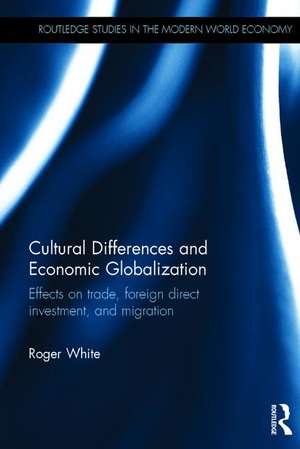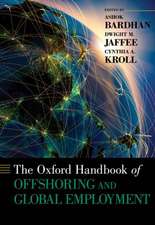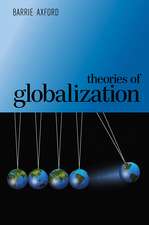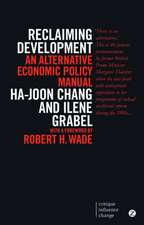Cultural Differences and Economic Globalization: Effects on trade, foreign direct investment, and migration: Routledge Studies in the Modern World Economy
Autor Roger Whiteen Limba Engleză Hardback – 10 noi 2015
This book examines cultural differences as a potential impediment to economic integration. Relying on rigorous statistical and econometric techniques, the analyses indicate that higher transaction costs, due to greater cultural distance, inhibit both the volume of trade flows and the successful completion of trade deals. Cultural distance appears to reduce foreign direct investment, as well as divert investment to less culturally-distant destinations. This book finds a negative relationship between migration flows and cultural distance. It considers the common criticism that repeated and intensified integration diminishes cultural differences, resulting in cultural homogeneity.
This book offers the first comprehensive examination of the relationships between cross-societal cultural differences and economic globalization. It will be of great interest to scholars and students who study globalization, international economics, and cultural studies.
Din seria Routledge Studies in the Modern World Economy
-
 Preț: 310.84 lei
Preț: 310.84 lei - 8%
 Preț: 389.45 lei
Preț: 389.45 lei -
 Preț: 384.86 lei
Preț: 384.86 lei -
 Preț: 324.35 lei
Preț: 324.35 lei -
 Preț: 310.33 lei
Preț: 310.33 lei -
 Preț: 385.79 lei
Preț: 385.79 lei -
 Preț: 326.15 lei
Preț: 326.15 lei -
 Preț: 298.64 lei
Preț: 298.64 lei - 18%
 Preț: 1112.34 lei
Preț: 1112.34 lei - 26%
 Preț: 992.21 lei
Preț: 992.21 lei - 15%
 Preț: 714.29 lei
Preț: 714.29 lei - 18%
 Preț: 1054.27 lei
Preț: 1054.27 lei - 26%
 Preț: 821.46 lei
Preț: 821.46 lei - 18%
 Preț: 1167.78 lei
Preț: 1167.78 lei - 15%
 Preț: 699.01 lei
Preț: 699.01 lei - 18%
 Preț: 946.06 lei
Preț: 946.06 lei - 18%
 Preț: 1230.51 lei
Preț: 1230.51 lei -
 Preț: 398.18 lei
Preț: 398.18 lei - 18%
 Preț: 1167.61 lei
Preț: 1167.61 lei - 26%
 Preț: 1014.31 lei
Preț: 1014.31 lei - 25%
 Preț: 823.99 lei
Preț: 823.99 lei - 26%
 Preț: 822.54 lei
Preț: 822.54 lei - 18%
 Preț: 1166.68 lei
Preț: 1166.68 lei - 26%
 Preț: 849.65 lei
Preț: 849.65 lei - 18%
 Preț: 1278.70 lei
Preț: 1278.70 lei - 18%
 Preț: 1059.84 lei
Preț: 1059.84 lei - 15%
 Preț: 699.01 lei
Preț: 699.01 lei - 25%
 Preț: 1022.76 lei
Preț: 1022.76 lei - 24%
 Preț: 564.95 lei
Preț: 564.95 lei - 18%
 Preț: 720.49 lei
Preț: 720.49 lei - 18%
 Preț: 1061.93 lei
Preț: 1061.93 lei - 15%
 Preț: 643.71 lei
Preț: 643.71 lei - 18%
 Preț: 711.10 lei
Preț: 711.10 lei - 18%
 Preț: 905.11 lei
Preț: 905.11 lei - 18%
 Preț: 1109.21 lei
Preț: 1109.21 lei - 18%
 Preț: 1171.89 lei
Preț: 1171.89 lei - 18%
 Preț: 1064.67 lei
Preț: 1064.67 lei - 18%
 Preț: 1167.43 lei
Preț: 1167.43 lei - 18%
 Preț: 1057.05 lei
Preț: 1057.05 lei -
 Preț: 423.30 lei
Preț: 423.30 lei - 18%
 Preț: 1063.28 lei
Preț: 1063.28 lei - 18%
 Preț: 1167.36 lei
Preț: 1167.36 lei - 18%
 Preț: 1123.68 lei
Preț: 1123.68 lei - 15%
 Preț: 694.09 lei
Preț: 694.09 lei -
 Preț: 398.44 lei
Preț: 398.44 lei - 18%
 Preț: 1219.38 lei
Preț: 1219.38 lei - 26%
 Preț: 873.52 lei
Preț: 873.52 lei - 18%
 Preț: 1062.93 lei
Preț: 1062.93 lei - 29%
 Preț: 1030.16 lei
Preț: 1030.16 lei - 26%
 Preț: 765.84 lei
Preț: 765.84 lei
Preț: 1057.89 lei
Preț vechi: 1290.10 lei
-18% Nou
Puncte Express: 1587
Preț estimativ în valută:
202.42€ • 211.35$ • 167.53£
202.42€ • 211.35$ • 167.53£
Carte tipărită la comandă
Livrare economică 04-18 aprilie
Preluare comenzi: 021 569.72.76
Specificații
ISBN-13: 9781138891807
ISBN-10: 1138891800
Pagini: 260
Ilustrații: 40
Dimensiuni: 156 x 234 x 16 mm
Greutate: 0.54 kg
Ediția:1
Editura: Taylor & Francis
Colecția Routledge
Seria Routledge Studies in the Modern World Economy
Locul publicării:Oxford, United Kingdom
ISBN-10: 1138891800
Pagini: 260
Ilustrații: 40
Dimensiuni: 156 x 234 x 16 mm
Greutate: 0.54 kg
Ediția:1
Editura: Taylor & Francis
Colecția Routledge
Seria Routledge Studies in the Modern World Economy
Locul publicării:Oxford, United Kingdom
Public țintă
Postgraduate and UndergraduateCuprins
I. GLOBALIZATION, ECONOMIC INTEGRATION, AND CULTURAL DIFFERENCES 1. Introducing Culture and Globalization 2. Waves of Globalization: Past and Present 3. The Unevenness of Economic Globalization 4. Dimensions of Cross-societal Cultural Differences II. DO CULTURAL DIFFERENCES HINDER ECONOMIC GLOBALIZATION? 5. Expected Relationships between Cultural Distance and Facets of Economic Globalization 6. The Influences of Cultural Distance on International Trade 7. The Link between Cultural Distance and Foreign Direct Investment 8. Origin-Destination Cultural Distance and International Migration III. INTERPRETING A CULTURAL DISTANCE – ECONOMIC GLOBALIZATION NEXUS 9. Economic Globalization and the Potential for Cultural Homogenization 10. The Implications of being Culturally Distant
Notă biografică
Roger White is Associate Professor of Economics and Douglas W. Ferguson Chair in International Economics at Whittier College, California, USA
Descriere
This book examines cultural differences as a potential impediment to economic integration. Relying on rigorous statistical and econometric techniques, the analyses indicate that higher transaction costs, due to greater cultural distance, inhibit both the volume of trade flows and the successful completion of trade deals. Cultural distance appears to reduce foreign direct investment, as well as divert investment to less culturally-distant destinations. This book finds a negative relationship between migration flows and cultural distance. It considers the common criticism that repeated and intensified integration diminishes cultural differences, resulting in cultural homogeneity.















